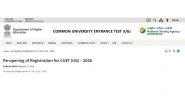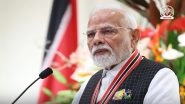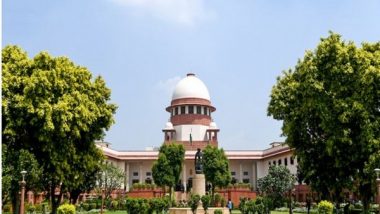New Delhi, February 3: The Supreme Court on Friday directed the Centre and some States to file responses on a plea moved by a Muslim body, seeking the transfer of 21 cases that have challenged controversial State laws regulating religious conversions due to interfaith marriages to the top court.
A bench of Chief Justice DY Chandrachud and Justice PS Narasimha issued a notice to the Centre and six States on the Jamiat Ulama-e-Hind's plea. Supreme Court Issues Notice to Centre on Appeals Against Blocking BBC Documentary ‘India: The Modi Question’.
The plea sought a transfer of three petitions pending in the Gujarat High Court, five in the Allahabad High Court, three in the Himachal Pradesh High Court, three in the Jharkhand High Court, six in the Madhya Pradesh High Court and one petition in the Karnataka High Court, which have challenged the respective State laws. Centre has Decided to Expand Branches of Supreme Court to Three More Locations? PIB Fact Check Debunks Fake Claim, Reveals Truth.
Several PILs were filed in the top court challenging anti-conversion laws passed by some State governments. Earlier, the top court on January 6, 2021, had agreed to examine the constitutional validity of a spate of laws enacted by State governments such as Uttar Pradesh and Uttarakhand that criminalise religious conversion via marriage and mandate prior official clearance before marrying into another faith.
The apex court had however not stayed the implementation of the Prohibition Of Unlawful Conversion of Religion Ordinance, 2020 and the Uttarakhand Freedom of Religion Act, 2018.
Gujarat and Madhya Pradesh governments have also filed plea challenging the interim orders of the respective High Courts that stayed certain provisions of the State laws on conversion.
The Centre had earlier opposed the plea of activist Teesta Setalvad's NGO, 'Citizens for Peace and Justice' (CJP) saying the NGO has no locus to challenge the anti-conversion laws passed by several States.
The Centre had said the NGO espouses divisive politics, seeks to divide society on religious and communal lines, and suggested that the court may hear the challenge to the law by all other petitioners barring the NGO, of which activist Setalvad is the Secretary.
Jamiat Ulama-i-Hind had moved the top court, challenging the anti-conversion laws of Uttar Pradesh, Madhya Pradesh, Gujarat, Uttarakhand and Himachal Pradesh. It had contended that these laws have been enacted to "harass" interfaith couples and implicate them in criminal cases.
The apex court while hearing pleas challenging the laws, had issued notices to the Uttarakhand, Himachal Pradesh and Madhya Pradesh governments. The pleas in the apex court stated that "rampaging mobs are lifting off people in the middle of wedding ceremonies," buoyed by the enactment of the laws. The laws were against public policy and society at large, they added.
The controversial Uttar Pradesh Ordinance relates to not only interfaith marriages but all religious conversions and lays down elaborate procedures for any person who wishes to convert to another religion.
The Uttarakhand government in its laws has a provision of a two-year jail term to any person or persons found guilty of religious conversion through "force or allurement".
The pleas stated that the laws passed by Uttar Pradesh and Uttarakhand against 'Love Jihad' and punishments thereof may be declared ultra vires and null and void because they disturb the basic structure of the Constitution as laid down by the law.
(The above story is verified and authored by ANI staff, ANI is South Asia's leading multimedia news agency with over 100 bureaus in India, South Asia and across the globe. ANI brings the latest news on Politics and Current Affairs in India & around the World, Sports, Health, Fitness, Entertainment, & News. The views appearing in the above post do not reflect the opinions of LatestLY)













 Quickly
Quickly


